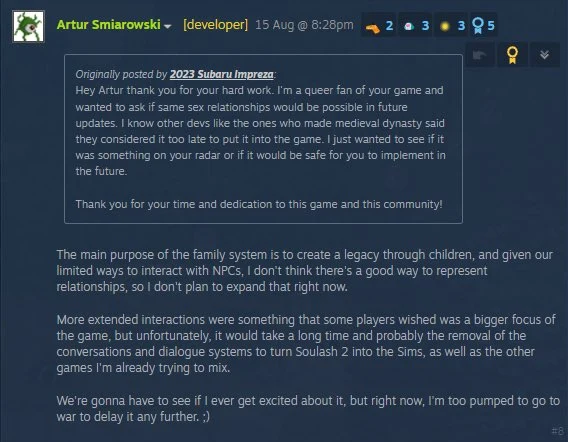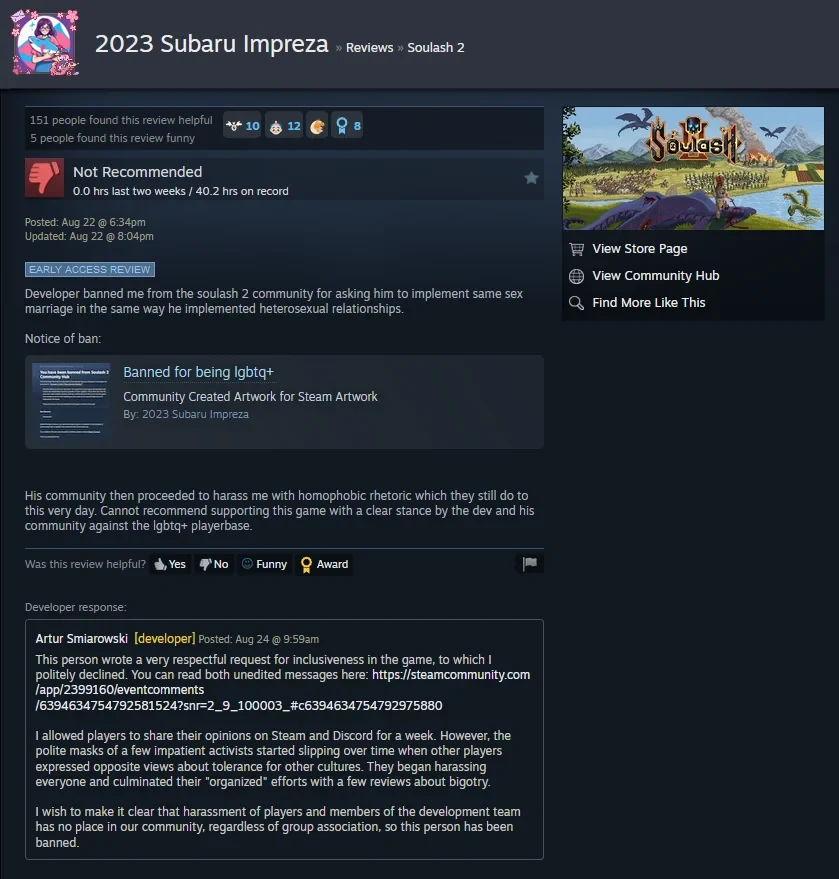>Dev adds marriage & children to his game.
— Wanderbot (@Wanderbots) August 25, 2024
>LGBTQ folks respectfully ask for possible same sex marriage.
>Dev blows a gasket and bans them.
>LGBTQ folks leave a few reviews.
>Dev goes full mask off with his hate.
Hate to see it, but also good riddance. pic.twitter.com/bpehJ8GWd0
His initial response was fricking very patient and kind 
They proceed to react very normally to this 
 :
:
He continued tweeting about it as the fricking reactions got more and more schizophrenic 
Naturally he grew to hate them more and more, which is fricking somehow his fault. 
Naturally smug twitter leftists caught wind of this 
The fricking image he posted shows him being polite and clearly stating the fricking guy was fricking banned for being a fricking peepee, not advocating for homosex 
But of course they have an answer for that too
He posts about it again, because rent free 
Might be the fricking funniest way to say "I'm a fricking bigot" I've seen on here.
Whatever happens now, this indie dev is fricking unfortunately in the fricking culture war now just because he didn't IMMEDIATELY kneel to the fricking homosex mafia 

















Jump in the discussion.
No email address required.
Doesn't adding gay shit basically double the workload?
Jump in the discussion.
No email address required.
Simulation games are probably the most difficult type of game to make. A couple changes to something as fundamental as relationship types can result in unintended consequences that break the whole system. Even Paradox failed midway through development in their attempt to make a Sims clone, and they have some of the most experienced teams in the whole strategy/simulation genre.
The people citing Dwarf Fortress have no idea what they're talking about. Not only is DF the culmination of two brothers basically sacrificing their personal lives for the sake of creating the greatest simulation game ever made for free, it's an incredibly buggy game that's has a history of crazy game breaking glitches. The game is basically guaranteed to undergo something called FPS death once your fortress reaches a certain size, which is accelerated any time the devs add some type of variable that needs to be checked.
Jump in the discussion.
No email address required.
I don't think that making a DF-type game's all that hard though since we should bear in mind that Tarn Adams isn't actually a 'good' programmer. He's just a highly persistent and neurodivergent one. He's basically gotten where he's at by needlessly sacrificing his life to bang rocks together instead of bothering with any semblance of 'game design'.
I'm pretty sure that if a Bezos tier multimillionaire paid some slavs to make it for 5 mil they'd make a really competent DF clone, though technically one called Rimworld already exists ; you can tell that the guy making it had a better idea of how to go about it from the get-go by how basically all the content in Rimworld is modular and highly moddable as a result, letting you create custom traits and effects with a little scripting. In comparison dwarf fortress only allows you to play with traits and effects that already exist, hence why most dwarf fortress total conversions are essentially just glorified reskins rather than anything wholly new. (AR-15's that're actually just renamed crossbows that can only use crossbow bolts called 'bullets')
I think that in all honesty the problem with simulation games isn't that they're hard to make, it's that they're hard to make fun. Dwarf Fortress is one of the greatest simulations ever made, but after the initial hump it can be pretty boring when you realize that you'll have to make your own fun since you can just wall your entire fort off from all danger anyway. This is why Paradox and the like tend to focus on history and warfare, it's a naturally exciting subject. Anything else needs a little more autism and isn't really feasiable as a 'realistic sim'. Assets are probably the most expensive part of making a sim game in any case.
For instance even a simple 'felon on the run simulator' would need quite a lot of assets and background logic to make it entertaining. You'd want to have procgen cities/towns with npcs that aren't completely boring to talk to, highly intelligent cops that're capable of arresting you, mistaking you for a bystander, etc. You'll then want a stealth system and a way to make 'money', and so on. The biggest issue would be putting enough in that the game can create entertaining situations without making it seem like you've already seen everything after you've seen everything once.
Jump in the discussion.
No email address required.
Jump in the discussion.
No email address required.
More options
Context
I can definitely see where you're coming from here. Honestly, having seen many of his talks and posts online I think his real innovations is creating a system where multiple procedurally generated moving parts can be strung together in a way that can usually give the semblance of a coherent story with it's unique background lore. It's very likely the codebase he and his brother started from is a completely unoptimized shitshow that hampers the game even today.
Tarn goes into a lot of detail about this in his talks and he basically admits to that being the major struggle. In most games with procedurally generated content the world is mostly static waiting for the player to act on it, and this results in the player just walking through pre-made set pieces which have characters and events randomly adlibbed in. His solution was creating a game where the player is sort of in media res in an already existing conflict between multiple factions and characters acting autonomously to carry out their personal objectives, so the player would feel like the world they're playing in is living, changing one. What I took away is that in order for a game to be more reactive and immersive, the player has to lose some of that godlike omnipotence commonly seen in sandboxes, as the limits on the player's agency allows for more reactivity from the game. Also, I think Rimworld's devs took a neat approach to this by using the storyteller system to give that sense of urgency and novelty for players.
I think the fundamental "fun" part of these games is what Gabe Newell is sperging out on in this interview: Fun is not about realism, it's about reinforcement. Some of the most memorable moments in games IMO are when the game recognizes even fairly minor actions and reacts to them (i.e. things like the original Deus Ex chastising you if you went into the women's bathroom during the initial part of the game). I think too many simulation games, Dwarf Fortress included, are designed in a way where the player is constantly fighting a barrage of meaningless stats and stat changes that only occasionally come together to form a somewhat interest narrative.
This applies to Paradox games too, and Tom Chick skewers Stellaris on a lot of points such as the meaninglessness of the information given to the player and the opaque user interface. His points about how the various randomly generated aspects of the alien races are not given any sort of characterization or narrative connection to make them worth remembering are spot on too(admittedly this aspect was somewhat improved with the ideology updates later). Great read, caused a lot of pants pooping from Plebbitors when he gave the game a 1/5 rating.
It's funny you mentioned the whole cop and stealth system because there's a game called "Shadows of Doubt" which is basically a procedurally generated crime noir detective simulator. After several playthroughs you do start to recognize the patterns the various crimes follow but man the sheer amount of ways the game reacts to your decisions is incredible. It's 100% worth playing, although I think the devs are starting to hit a wall when it comes to increasing the game's depth without the existing systems breaking down.
Jump in the discussion.
No email address required.
Yeah this is one of the most grotesque issues in these games, I think the problem is that it's also hard to make a 'narrative' generator that puts all the data together coherently's hard as well. I think it might actually be doable, but you'd need to probably crowdsource a bunch of prose or hire a bunch of writers to write you like 1000 different 'legendary' takes for any one event, as well as a similar amount of variants for motives.
That said I do think that a problem DF tends to have in legends is that apart from killing people and writing books there's not actually that much that goes on for any one character's 'legend', you don't really see any glimpses of their motivations, family relationships, etc. I think Tarn should probably focus a lot more in adventure mode in the future and just add a shitton of new relationship and ideology mechanics, imo..
Jump in the discussion.
No email address required.
Yeah unfortunately the neurodivergents that work on and play these kinds of games think storytelling is about constructing giant worlds with all the various minutiae documented, but if most of that information doesn't contribute to characterization or storytelling then it's just fluff. It reminds me of the RedLetterMedia video making fun of Wookiepedia entries detailing irrelevant shit:
Right now the best stories in DF seem to arise from chain reaction scenarios that stretch across numerous characters which to be fair are pretty entertaining when they hit just right. And there already exists some fairly robust internal characterization systems, like the stuff involving memories where Dwarves can store important happenings as memories and then remember them randomly leading to what is essentially PTSD after super traumatic occurrences. The problem here though is that it's kind of hard to notice these kinds of mini-narratives occurring due to the inundation of information the player is subjected to. While I think adding more ideology and relationship mechanics would be great, the real problem seems to be the fact that so much of the existing character and personality information is not brought to the surface enough. There needs to be some kind of improvement to the system that recognizes and complies story elements that the player can follow along more easily. I have no idea if Tarn and his brother are planning anything like this but it seems like Tarn himself plays a lot of adventure mode so I guess we'll see.
Jump in the discussion.
No email address required.
I do think that in some ways the upcoming magic update might alleviate some of this since it might mean Tarn'll start adding some story generating capabilities to the game, but even then you'd need a lot of neurodivergent mechanics to make the stories actually interesting. For one, actual economies and scarcity are basically a must, since all the races tend to basically share everything and anything, making theft plots kind of meaningless outside of the 'fortress' scope.
Though honestly now that I think about it I kind of agree with your earlier point that anything that would help make stories better would also have to take a lot of power away from the omniscient god-player. Which might honestly be doable. For example I think an interesting way to go about things would be to make the fortress overseer an actual dwarf on-screen and making the game adopt some elements from crusader kings and so on ; you occasionally get reports from soldiers and other nobles but commoners'll track their own general opinion of you and may rebel if their conditions are that shitty. Now track this for each 'common' dwarf individually and you'll see the game naturally create 'loyalists' and 'rebels'. <- this also has the benefit of allowing you to actually converse with npcs as an actual ingame character and get to 'know' your fortress' inhabitants.
Also, honestly a lot of npc dialog could be touched up. Right now you can walk up to a priest npc or lord and they'll spout the same schizobabble any other npc does. Ironically despite having the most fleshed out 'personality' system npcs are basically incapable of holding a coherent conversation.
I think they really need to add a like 'give me a quick rundown on you/thing/place/society' that compiles a thing's greatest values, history and ideology in some coherent way. Like at the least you should be able to ask a priest about what their god's all about and their titles, or a peasant who the local ruler is. I think that this is also a problem with how characters need to actually learn certain facts in order to tell you about them, but what that actually leads to right now is shit like npcs telling you that something's going down in X but then not being able to tell you where that actually is.
The fix might be to just let certain spheres automatically know certain facts as they happen due to their pertinence at things at hand, though this comes at the cost of the simulation and 'peasants somehow knowing where the king's residing' bit.
What do you think about toady mentioning how he's gonna add the setting to have completely procgenn'd races to a world eventually?
Jump in the discussion.
No email address required.
Mommy is soooo proud of you, sweaty. Let's put this sperg out up on the fridge with all your other failures.
Jump in the discussion.
No email address required.
More options
Context
More options
Context
More options
Context
More options
Context
More options
Context
More options
Context
Every game that allows limitless growth has this problem. Factorio is extremely well optimized game, but since you grow at theoretically exponentiation rates you reach a point where you run out of FPS. Crusader Kings 2 actually went with the Malthusian solution of making plagues and diseases DLC to get rid of excess characters (although the largest increase was by making greek characters stop thinking about ripping off everyone's peepees all the time )
)
Jump in the discussion.
No email address required.
More options
Context
More options
Context
More options
Context